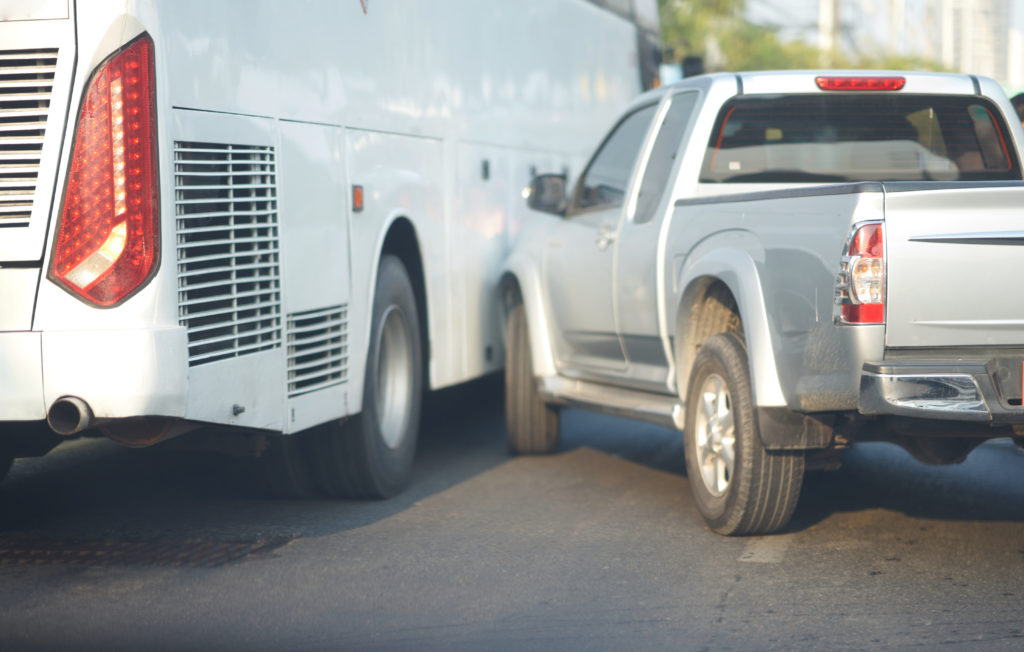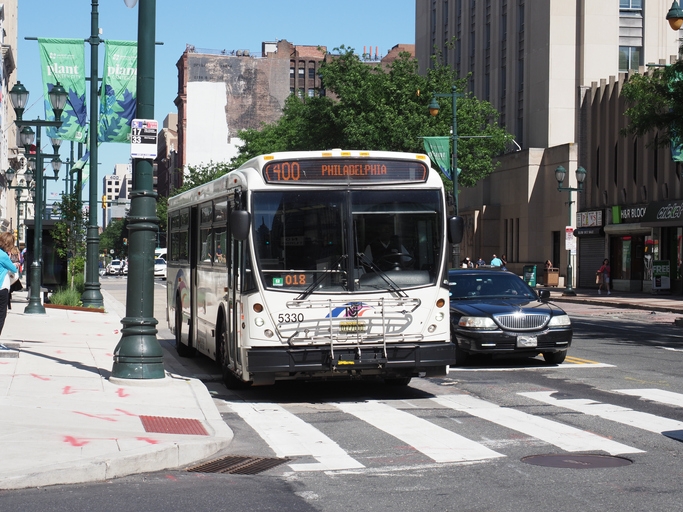Whenever people board a bus, they are trusting their safety to the skills of the driver and the professionalism of the bus company. The last thing to cross any passenger’s mind is that they may suffer a serious injury. However, accidents can and do happen. Victims of a bus accident may be entitled to monetary compensation for personal injuries.
What to Do After a Bus Accident
A person who has been in a bus accident may be emotional and distressed, even if he/she hasn’t been injured. Although frightened and/or out of sorts, there are several steps a person should take, if possible.
Dial 9-1-1. In most cases, someone will call the police following an accident. However, if someone has not called or refuses to call, then the passenger(s) must dial 9-1-1 right away. By law, a police report must be filed so an officer can document the details of the crash.
Seek medical attention. Getting needed medical treatment is a person’s top priority after calling the police. Keep in mind that a person may not realize he/she is injured immediately after an accident. The shock and stress caused by the crash may hide pain and other symptoms of injury. Sometimes, such as with head or neck injuries, symptoms may not show up until days or even weeks after the crash. The longer someone waits to get medical treatment, the more difficult it will be to link the injuries to the accident.
Document the accident. Medical attention comes first, always. But if it is feasible, a person should document details of the accident by:

- taking photos or videos of the scene,
- getting the contact information of the driver and other passengers, and
- writing down accident details, including the weather, time of day, road conditions, number of other vehicles involved (if applicable), or anything else that may seem relevant.
In addition, keep records of all medical treatment starting from the day of the accident. Again, the full severity of an injury may not be known until long after the crash. If the injuries justify a personal injury case, the medical records will be critical evidence.
Call an attorney. As soon as possible, contact an experienced personal injury attorney. The attorney can analyze the severity of the injury and the circumstances of the accident to determine if a person is eligible for compensation.
Refuse to speak to anyone else’s attorney or investigator. A large private bus company will likely have its own attorneys and/or investigators who will be quick to contact as many passengers as possible. These attorneys and investigators are looking out for the bus company and may ask misleading questions or fish for responses that weaken a victim’s case. Do not speak to an attorney or investigator representing the bus company.
The best thing to do if someone is contacted by an outside attorney or investigator is to put them in touch with their own attorney. Beyond that, it’s best to say nothing, answer no questions, and ignore any threats.
What Will Insurance Cover?
To operate in New Jersey, bus companies must have Medical Expense Benefits Coverage (MEB), sometimes called “Bus-PIP” (personal injury protection). This insurance covers injuries to passengers when the driver or company itself is liable. MEB has a maximum payout of $250,000 per person injured.
This amount is meant to cover all “reasonable” medical costs associated with the accident, including co-pays, medication, lab tests, and more. However, it will not cover loss of work, pain and suffering, or any other non-medical costs that result from the bus accident. The only exception is if an injury is permanent. A personal injury lawyer can help to recover these non-medical costs when a permanent injury is caused by the accident.
What Is Considered a “Bus”?

Not everything that is commonly referred to as a “bus” is required to have MEB coverage. For example, school buses, limos, hotel shuttles, and cabs are exempt from this requirement in New Jersey. In these cases, it will depend on the type of insurance that the driver and/or operator carry.
In the Nebinger v. Maryland Casualty Co. case, several senior citizens were riding in a minibus operated by the nursing home where they lived. The seniors were injured when the bus collided with a truck and they sued the nursing home’s bus insurer for Medical Expense Benefits. The insurer argued that the policy on the minibus did not include MEB coverage and was not required to by New Jersey law.
The Appellate Division ruled in favor of the insurer. The court reasoned that New Jersey law defines a bus as a vehicle “used for the transportation of passengers for hire.” The seniors did not pay a fare to ride the minibus; instead, bus rides were part of the services they received from the nursing home. Therefore, the court found that the minibus did not transport passengers for hire, so it was exempt from the MEB coverage requirement. This case demonstrates that New Jersey only requires charter buses and buses that operate regular routes to carry MEB insurance.
School bus companies have a PIP threshold of just $10,000 per injured child. And, suing a bus owned and operated by a government entity (e.g. NJ Transit or some school districts) is very different than suing a private company.
Sometimes the only responsible party is the bus driver, and not the bus company. In this case, how much insurance will cover depends on the kind of insurance he/she has. Bus drivers are not required to have any more insurance coverage than regular drivers.
What if You’re Injured by a Bus but Not as a Bus Passenger?
Buses are only required to carry PIP coverage for their own passengers, not for other people who might be injured in a bus accident. But the Appellate Division of the Superior Court of New Jersey has ruled that a non-passenger can seek non-economic damages by way of an ordinary negligence lawsuit.
In Lymon v. Cape Transit, a bus rear-ended another vehicle while driving on a highway. The driver of the vehicle sued the bus owner for negligence and sought compensation for more than just medical bills. The bus owner argued that the other driver, like bus passengers, could only sue for personal injury protection (PIP) benefits to cover the cost of medical bills. However, the court sided with the driver in this case, establishing that while bus passengers are restricted to economic damages (through PIP), other drivers hit by a bus are not.
Personal Injury Cases Against Public Entities

When a bus is operated or owned by a public entity, such as NJ Transit or a local school district, there are limits on those lawsuits. This section outlines these limitations, but it is best to consult with an experienced attorney if your injuries occurred while riding on public transportation.
First, one must file a Notice of Claim with the appropriate governmental entity within 90 days of the date when the damage/injury occurred. Those who miss this 90-day deadline generally cannot sue (with some rare exceptions).
Second, due to the sheer number of things a public entity must manage, the law restricts the type of lawsuits that can be brought over the conditions on public property. For example, a person can only sue if there was a “dangerous condition” where the risk of injury was very substantial and foreseeable (e.g. faulty brakes).
Third, the law limits the damages a person can be awarded in a lawsuit against a public entity. If an injury is not permanent, the person can only receive enough to cover medical bills. Awards for pain and suffering or other non-economic damages are available only if an injury is permanent. And, as with all personal injury claims, compensation for medical bills will not be awarded for even non-permanent injuries unless you have proper medical documentation.
The New Jersey Superior Court has held that a person seeking damages against a public entity must show economic losses (like medical bills) or proof of permanent injury. In Gibson v. New Jersey Transit, a person walking down the aisle of a bus operated by NJ Transit claimed to suffer an injury when the driver slammed on the brakes. He sued NJ Transit for negligence and also sought damages for pain and suffering.
The court sided with NJ Transit before the case reached a jury because the bus passenger did not provide any medical evidence that he had suffered permanent injuries, nor did he provide medical bills for non-permanent injuries. So, although he could recover economic damages, he had no medical proof to support his claim.
Lastly, the law requires that anyone suing a public entity prove that the public entity both knew about the condition and had a reasonable time prior to the accident to correct it. In general, public entities are normally immune to lawsuits claiming they did not provide protection because that immunity is designed to let the government make policy decisions. But there are exceptions. For example, a public entity like NJ Transit can be held liable for a bus driver’s failure to prevent violence from occurring on a bus.
In the Maison v. NJ Transit case, a woman was riding on a bus operated by NJ Transit when a group of teenagers sitting a few rows behind her began to harass her. She argued with the teens for several minutes. After they turned back around, one of the teenagers threw a glass bottle at her, which struck her in the head and injured her. The bus driver saw the entire incident and did not stop the bus or intervene until the woman was hit with the bottle. She sued and won $1.8 million.
NJ Transit argued the verdict should be set aside because the suit should have been barred by its public entity status, but the Appellate Division of the Superior Court disagreed and upheld the verdict. The public entity immunity did not apply to this case. Here, whether the bus driver should have intervened was not a policy decision; it was just inaction on the part of the bus driver.
Public Entities and Uninsured Motorist Coverage
The state’s requirement that all motor vehicles carry uninsured motorist coverage does not apply to vehicles owned by public entities. Public entities may, or may not, buy it. So, a person injured by an uninsured motorist while riding in a publicly owned bus can’t expect to receive uninsured motorist compensation unless the public entity bought uninsured motorist coverage.
This was shown in the Ross v. Transport of New Jersey case, where a public bus passenger was injured when a stolen car collided with the bus. The bus passenger first sued the car’s driver and won $5,555. However, the driver was unable to pay so she then sued the public entity, arguing that it was required to carry uninsured motorist insurance coverage. After analyzing the state’s various laws requiring insurance coverage, the Supreme Court of New Jersey found that the laws were specifically written so that public entities could operate buses and cars without this insurance.
Types of Injuries Caused by Bus Accidents
Bus accidents can cause severe damage to the spinal cord, brain, head, legs, and arms. Whiplash, closed head injuries, and even memory loss may result. Some think that a broken bone or minor injury is not worth suing over, but it probably is. Bus drivers have a duty to take care of their passengers and are responsible for injuries that they cause due to breaching that duty.
Any medical bills that must be paid due to a bus accident should not be a cost for the victim to bear. After all, the passenger trusted that a bus driver would carry out his/her job duties prudently and reasonably.
Determining Liability
Figuring out who to sue in a bus accident is not a simple matter. An experienced attorney will know which party or parties should be sued after hearing the facts of the case.
An accident can be the fault of the driver making a poor decision (e.g. speeding). In some cases, the driver, not the bus company, is found to be at fault. However, in other cases, both the bus company and the driver may be liable. For example, if the bus driver was intoxicated or taking medication that prohibited him/her from operating a vehicle, then the company may also be responsible for allowing that person to drive the bus.
Sometimes a third party is at fault either in place of or in addition to the driver or bus owner. This may be true when the bus collides with another vehicle.
The police report is one of the first things that must be examined to determine fault. Other facts that are important include photos or videos of the crash scene, as well as testimony from the bus driver or other drivers involved in an accident. Eye witnesses can also provide key evidence. In some cases, the driver’s New Jersey motor vehicle record can be used to determine if he/she had a chronic habit of traffic infractions (which may beg the question of whether the bus owner knew of it).
In yet another scenario, injuries being claimed may have existed prior to the current accident in question. They may be the result of another, earlier incident. You should know that the Appellate Division of the Superior Court has allowed juries to weigh conflicting evidence and decide who is responsible for injuries.
In Rodriguez v. Coach USA, a woman was attempting to get off a bus when the driver closed the doors. The woman’s face became trapped between the doors. When the bus driver noticed this, he stopped the bus and reopened the doors, causing the woman to fall back and hit her head. She suffered from injuries to her neck and jaw and sued the bus owner for personal injury. The bus owner argued that her injuries were actually caused by a car accident she had been in four years earlier. The court reasoned that a jury should be allowed to hear all of the medical evidence to determine which injuries were caused by which accident.
Bus Accident Statistics
Every year, several hundreds of people die due to bus accidents. The National Highway Transportation Safety Administration estimates that there were 60,000 bus accidents in 2018, the earliest year for which there is data. Bus accidents are serious, life-threatening, and occur for a variety of reasons.
Buses are heavy and difficult to drive without proper training. If an ill-trained driver gets behind the wheel, he/she may be risking the lives of his passengers. But poor driving skills are not the only cause of accidents and injuries on buses. The top seven causes of bus accidents are:
- Driver error
- Weather conditions
- Lack of seat belts or other safety equipment
- Faulty emergency exits
- Dangerous roadways
- Flammable seat cushions
- Improper maintenance

Case Study: $3.9 Million
What makes this case unique: Competing arguments on whether the victim had experienced “impending doom”; a big-shot attorney who was “too large” for the case.
Frequently Asked Questions
Yes, but one must send a “notice of claim” letter stating one’s intent to sue NJ Transit within 90 days of the accident. In addition, the standard to prove liability for any public entity is much higher than with private parties.
If a child is injured in a school bus accident, parents can potentially sue the school district, the bus company (if it is a private contractor for the district) and the driver.
Bus passengers are injured less frequently and less seriously than car passengers in accidents.
There is no ideal place to be in a bus when it crashes. However, generally toward the middle is the safest. If the bus has seat belts it is usually wise to use them.
Why You Should Hire an Attorney
Many buses are owned by government entities, like schools, and understanding all of the complex legal ramifications that come along with suing a government entity requires a high degree of knowledge, skill, and ability. Even when dealing with privately owned bus companies, a skilled bus accident lawyer is needed to navigate the rocky terrain of personal injury litigation in order to ensure that one’s rights are adequately protected.
Lastly, an attorney will know the various methods of going through insurance carriers, PIP carriers, etc. and be able to secure justice for the victim without having to make him/her go through administrative hurdles or tons of red tape.
Who Should I Contact if I’ve Been Injured in a Bus Accident?
You have a right to safe transportation! If you were injured by a bus, e-mail or call 888-883-5529 to speak to a NJ bus accident lawyer from Rosenblum Law. We have been helping personal injury victims from NJ bus accidents for many years. We will fight to ensure that you are fairly compensated.


